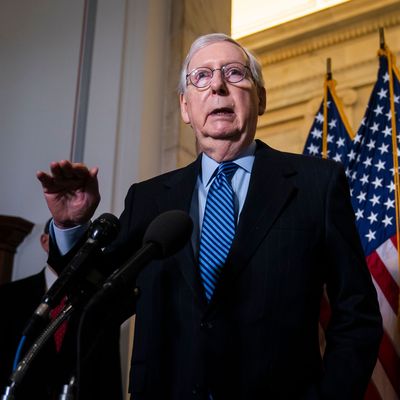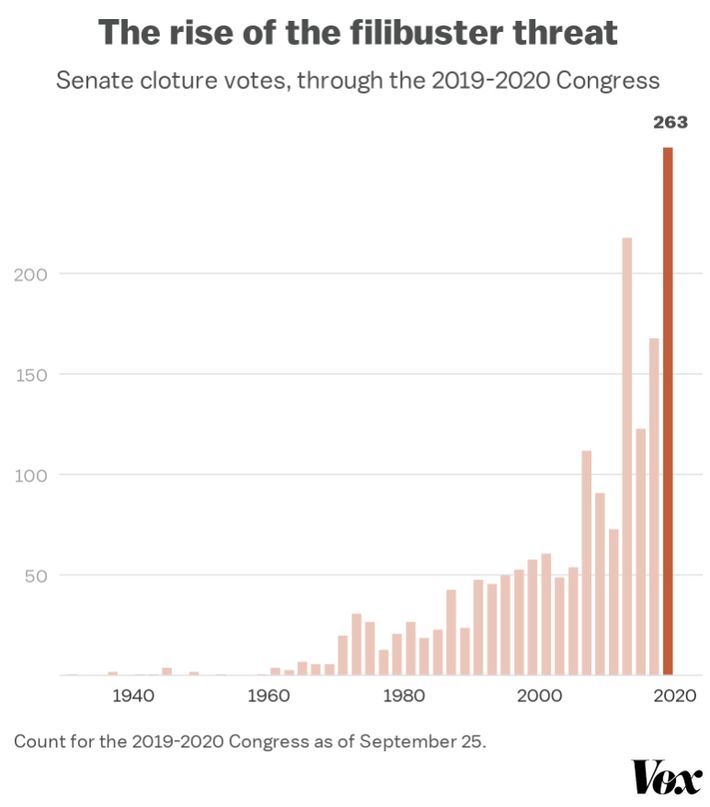
Mitch McConnell isn’t trying to tell moderate Democrats what to do. He just doesn’t want them to make the same mistakes he did when he was younger.
The Senate Minority Leader can see that Kyrsten Sinema and Joe Manchin are falling in with the wrong crowd. He knows that some cool kids from the big city are peer-pressuring them into doing something they know is wrong. And McConnell wants Joe and Kyrsten to understand that whatever “high” they get from abolishing the filibuster will be followed by an unbearable low. Which is why he is asking them, for their own sake, to just say no.
This was the gist of the McConnell’s remarks about the filibuster on the Senate floor Tuesday. In a statement titled “Democrats hypocritically killing the filibuster would break the Senate,” McConnell implored his Democratic colleagues to preserve the 60-vote threshold for all non-budgetary legislation for three primary reasons:
• The legislative filibuster is indispensable for ensuring “that federal laws in our big, diverse country earn broad enough buy-in to receive the lasting consent of the governed.”
• Abolishing the filibuster would not actually allow Democrats to implement their agenda. Rather, “Even the most basic aspects of our colleagues’ agenda, the most mundane tasks of the Biden presidency, would be harder, not easier, for Democrats in a post-‘nuclear’ Senate that’s 50-50.”
• Eventually, Republicans will come back to power and — if the filibuster has been abolished – will promptly “strengthen America with all kinds of conservative policies with zero input from the other side.”
Alas – while it may be heartbreaking for Sinema and Manchin to hear this – careful scrutiny of McConnell’s case suggests that he might not actually have the Democratic Party’s best interests at heart.
McConnell’s first argument is that the legislative filibuster is a vital safeguard against the tyranny of “slender majorities,” one that prevents the Senate from passing laws that lack broad support and fosters bipartisan cooperation.
None of this is true.
In 2017, McConnell’s party assumed full control of the federal government. When the Kentucky senator sat down with then–House Speaker Paul Ryan and President Trump to decide what laws they were going to pass, the legislative filibuster did not lead to abandon all policies that lacked “broad buy-in” all across our diverse country. To the contrary, they decided that their first legislative priority would be to throw millions of low-income Americans off of Medicaid and revoke affordable health insurance from people with pre-existing conditions. This idea polled at 28 percent, making it the most unpopular major bill introduced in at least three decades. Faced with these survey results — and the unified opposition of Senate Democrats — McConnell & Co. did not moderate their ambitions. Rather, they decided to push their historically unpopular health-care agenda through the budget reconciliation process, thereby enabling them to pass it on a party-line vote. As it happened, this plan failed. But it wasn’t the Senate’s 60-vote threshold that saved the Affordable Care Act; it was the majority leader’s inability to find 50 Republican Senators willing to take on Big Low-Income Diabetic.
But McConnell wasn’t chastened. Senate Republicans proceeded to propose a large tax cut for the rich that attracted broad, bipartisan opposition from the American people. To prevent this lack of public support from stymying his partisan agenda, McConnell once again used budget reconciliation to nullify the filibuster. This time, he succeeded.
So it’s clear that the Senate’s 60-vote threshold on non-budgetary bills isn’t stopping Senate majorities from passing laws that lack broad public support, and McConnell would oppose the legislative filibuster if it did do such a thing, since bills that lack public support are, more or less, the only kind he wishes to pass.
There is one other aspect of McConnell’s diatribe against tyrannical majorities that bears scrutiny. At one point in his speech, the senator asked rhetorically, “Does anyone really believe the American people were voting for an entirely new system of government by electing Joe Biden to the White House and a 50-50 Senate?”
Of course, the “American people” did not vote for a “50-50” Senate. The chamber’s 50 Democratic senators collectively represent roughly 41,549,800 more people than its 50 Republican senators. In fact, there has never been a time this century when the GOP’s Senate caucus represented more Americans than the Democratic one (even though Republicans have controlled the chamber for more than half of the past 20 years). At the time of the nation’s founding, America’s most populous state had roughly 13 times more people than its least populous state. Giving every state equal representation in the Senate — despite this disparity in population — struck many of the founders as indefensible. As Alexander Hamilton wrote in Federalist No. 22, “Every idea of proportion and every rule of fair representation conspire to condemn a principle, which gives to Rhode Island an equal weight in the scale of power with Massachusetts, or Connecticut, or New York; and to Delaware an equal voice in the national deliberations with Pennsylvania, or Virginia, or North Carolina.” Today, America’s largest state is 68 times as populous as its smallest.
Thus, the reason why the Democratic Party has a mere 50-vote majority in the Senate is not that the American people are narrowly divided about which party they wish to control the chamber. It is because the Senate grossly underrepresents high-population blue states. McConnell is not arguing that the Senate must respect the wishes of the American people writ large. He is arguing that the conservative movement must enjoy veto power over all non-budgetary legislation, even if it is wildly unrepresentative of the American people.
As for McConnell’s claim that the legislative filibuster facilitates bipartisan cooperation: It is worth noting that the de-facto 60-vote threshold for all bills has been around for less than 20 years, a period that has been defined by its exceptional partisan acrimony. The incentive for bipartisan lawmaking might actually be higher in a context where the minority does not have the option of simply blockading all of the majority’s priorities: If moderate Republicans were incapable of obstructing Democratic action on immigration or gun control, they might well work with centrist Democrats to moderate pending legislation.
McConnell’s second argument is that abolishing the filibuster will not actually allow Democrats to advance their agenda. This one sits awkwardly with every other argument he makes: Abolishing the filibuster would either make it “harder not easier” for Democrats to advance the most “basic aspects” of their agenda or it would clear the way for tyranny of the majority — but it can’t do both.
Nevertheless, McConnell vows that if Senate Democrats reform the filibuster in any way, he will use the minority’s remaining powers to make their lives a living hell:
This is an institution that requires unanimous consent to turn the lights on before noon, to proceed with a garden-variety floor speech, to dispense with the reading of lengthy legislative text, to schedule committee business, to move even noncontroversial nominees at anything besides a snail’s pace…Everything that Democratic Senates did to Presidents Bush and Trump, everything the Republican Senate did to President Obama, would be child’s play compared to the disaster that Democrats would create for their own priorities if they break the Senate.
This is an empty threat. Senate majorities are sovereign over the body’s rules. Just as a Senate majority can abolish the filibuster to overcome the minority’s obstruction, it can also revise the rules for routine Senate procedures to similarly neuter McConnell’s retaliatory intransigence.
The minority leader eventually acknowledged this point — then immediately ignored his own acknowledgement.
Perhaps the majority would come after the other rules next. Perhaps Rule 22 would just be the first domino of many, until the Senate ceased to be distinct from the House in any respect.
This chaos would not open up an express lane to liberal change. It would not open up an express lane for the Biden presidency to speed into the history books. The Senate would be more like a hundred-car pile-up. Nothing moving.
Either abolishing all constraints on majority power will make the Senate indistinguishable from the House (where the Democratic majority moves its priorities at will) — or doing so will turn the Senate into a hundred-car pile-up in which the minority lords over the majority — but, again, it can’t do both!
Maddeningly, McConnell immediately contradicts himself a third time, forgetting everything he just said about how abolishing the legislative filibuster will not create an express lane to policy change, in order to argue that:
As soon as Republicans wound up back in the saddle, we wouldn’t just erase every liberal change that hurt the country. We’d strengthen America with all kinds of conservative policies with zero input from the other side. Nationwide right-to-work for working Americans. Defunding Planned Parenthood and sanctuary cities on day one. A whole new era of domestic energy production. Sweeping new protections for conscience and the right to life of the unborn.
Here, Mitch McConnell is asking Democrats to believe that he values Senate tradition more than his own ideological goals. Which is audacious, coming from the man who refused to grant Merrick Garland a hearing in 2016 and abolished the filibuster for Supreme Court nominees the following year. In truth, if McConnell believed that abolishing the legislative filibuster would redound to the benefit of his party and ideological movement, there is no doubt that he would have done so by now. He has not done because the status-quo serves his partisan purposes. If your party’s top governing priorities are cutting taxes, arresting the growth of the regulatory state, and advancing plutocracy by judicial fiat, then the Senate’s current set-up is ideal: Tax cuts and judicial appointments can be executed by simple majority, while the legislative filibuster renders virtually the entire progressive agenda nonviable. Meanwhile, the legislative filibuster also enables Republican Senate majorities to avoid taking potentially difficult votes on their activist base’s most unpopular goals for social policy by pointing helplessly to Democratic opposition.
All this said, McConnell isn’t wrong that removing the filibuster could backfire on Democrats. As noted above, the Senate currently has a massive pro-Republican bias. As a result, it’s very likely that the GOP will hold the upper chamber more often than Democrats will in the years to come. Given that reality, it may actually be true that the Democratic Party has a greater interest in preserving minority rights in the Senate than the GOP does. But this is only true if Democrats do not use their Senate majority to grant statehood to D.C. and any other U.S. territory that wants it; pass the PRO Act to revitalize the union movement; ban partisan redistricting; expand voting rights; and enact other reforms that erode the Republicans’ structural advantages in our political system.
And there is no reason why Democrats can’t do all of that, once the filibuster is removed.
If Mitch McConnell weren’t afraid that his colleagues might realize this, he probably wouldn’t be offering them his disingenuous, self-contradictory advice.































